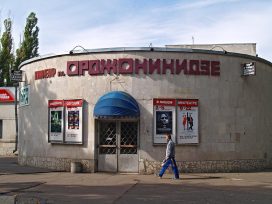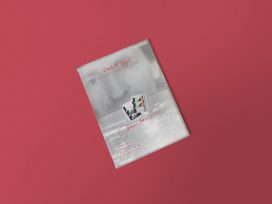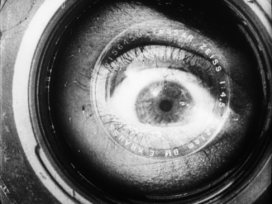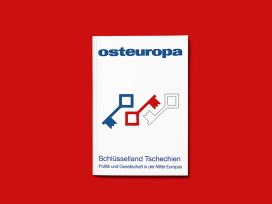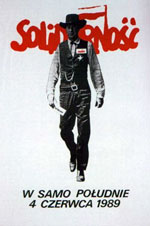 It all began with the pleasing features of Gary Cooper… In the run-up to the election on 4 June 1989, posters with the red Solidarity symbol and the caption “High Noon” were displayed throughout the People’s Republic of Poland. They showed a solitary, small-town sheriff on his way to the ballot-box to cast his vote for the Citizen’s Committee.
It all began with the pleasing features of Gary Cooper… In the run-up to the election on 4 June 1989, posters with the red Solidarity symbol and the caption “High Noon” were displayed throughout the People’s Republic of Poland. They showed a solitary, small-town sheriff on his way to the ballot-box to cast his vote for the Citizen’s Committee.
The fact that – despite the ultimate triumph of good over evil – the American 1952 western carried an underlying and very bitter message probably passed unnoticed. The population of the small town in the movie demonstrated no inclination at all to take a risk. They preferred passively to watch the events that were taking place. The inhabitants seemed all but indifferent to whether order would be restored by a group of unshaven thugs or their obsessively high-minded sheriff. Similarly, in the celebrated Polish election that was to “overturn communism”, almost 40 per cent of the electorate failed to vote. More than 10 million of the 27 million people entitled to vote simply waited to see who would take charge.
Wladyslaw Pasikowski – Psy (Pigs, 1992)
Who would take on the role of the Polish sheriff, fulfilling the exacting standards of a Hollywood movie? On the banks of the Vistula, who could be as upright and handle a gun as surely as Gary Cooper?
Hardly Lech Walesa, Jacek Kuron or Adam Michnik (those heroes of feature films that have never been made). All this gave rise to a problem. The vast majority of the Polish opposition was against the use of violence in the political struggle. The photocopier was fine; the Kalashnikov wasn’t. The Polish male had been broken by communism in more ways than one…
The film director Wladyslaw Pasikowski, meanwhile, was looking to combine the West (one that the Poles were worthy of) with those great mysteries of the East embodied in the secret services. In theory, he might have made a film about Adam Hodysz, for example, a major in the security service who was brave enough to help the opposition. But Hodysz’s story might have caused embarrassment to a number of people. In the early 1990s something more circumspect was required.
In times of uncertainty it can be salutary for fantasy to replace reality. The only comic-strip hero likely to fit the brutal and widely applauded action movies of the time was… an agent of the communist secret police – as unreal as the way in which we imagined freedom at the time. And so a quintessentially Polish demi-god was born. A man somewhat disjointed both psychologically and biographically. His name was Franciszek Maurer, age 37, married, one child, and attractively addressed in the film as “Franz”, in the German way (no prejudice). The incoherence of his personality made him a winner. He was remarkably well-suited to be the hero of our time, a figure in which Poles could see themselves as in a mirror – but one that offered them a special indulgence. Maurer was a man who could never have existed, and for this very reason could hope to become a hero in the collective imagination.
Maurer himself was quite as complex as the Round Table Agreements. He moved about in the murky depths of the political transition and in that sense constituted a Polish Everyman, save for one characteristic – he was a brilliant marksman. When asked by the verification commission how he had acted in the matter of a certain Captain Nowakowski, who had attempted to set up Free Trade Unions in his department in 1980, he responded: “I blew his head off with a Mauser 7.8mm cartridge.” Nowakowski was a peer of Maurer’s from college, incidentally (and presumably a friend).
In the new political landscape Maurer is a positive hero, transmogrified in the eyes of the viewer into a policeman of the new post-communist Poland. He is ready – in the aftermath of 1989 – to kill in the name of a different kind of justice, his notion of which is, if not backward, then at least rudimentary. Maurer¹s ethics belong to the age of King Hammurabi How are we then to view his hermeneutic powers? In Pigs, the adage “an eye for an eye and a tooth for a tooth” becomes the more epic “for the sake of principle” and is rounded off with a strong expletive. This way of looking at things was eagerly imbibed by the public at large.
Language
In the early 1990s, even multi-volume Polish dictionaries offered little in the way of invective. The surge of expletives flowing from the big screen deeply shocked some viewers. Others were delighted: “A human voice at last.” A macho film redolent of Hemingway could justify a language elaborately encrusted with abuse, and expressed the frustration people felt far more fully. If, emotional expression apart, profanity suggests a poverty of language, then it certainly reflected the difficulties of naming all that was happening as the political system changed.
No surprise then that Pasikowski introduced a new style into the language. The coming of the governments of the people marked the passing of the elitist language of the Cabaret of Elderly Gentlemen. They hadn’t abolished censorship in newly democratic Poland so that you wouldn’t be allowed to use the language like what it’s spoke. And alongside all this – what a breath of fresh air came blowing into relations between men and women via the uncommonly rich language of Pigs.
The film also cemented a particular kind of romantic relationship between men and women. Maurer’s girlfriend from a children’s home demonstrates a pragmatic approach to life, it is true (note that in the film the institution for young women features an obese and sadistic employee, fondly dubbed “the butcher in braces”). But our erstwhile UB agent is a romantic of the highest pedigree.
When asked about his ex-wife (“why did she leave?”) he famously responds: “Usual story. Because she was bad”. The dialogue goes on in a similar vein: “No blame on your side then?” “I’m a saint” (laughter). But later he adds, sadly: “Pity, because…”
Experienced Polish men who have “seen life” invariably come down in support of Maurer. His wife has left him and lives with their son in the United States. His brother lives in New Zealand, although it might as well be the moon. The lands of our dreams are, as ever, a curse on the stability of the family. Moreover, “staying in Poland” had to be justified if it was not to look like evidence of incompetence. Responding to his girlfriend’s question about what exactly he is doing in this place, Maurer responds: “Sorting it out.”
Files
The title, Pigs, in red lettering accompanied by the sound of a trumpet call, is displayed against footage of files that have been thrown onto a lorry. It is night on Rakowiecka Street and security service agents are mysteriously disposing of one of the main symbols of Polish life of the past 20 years.
The British historian Timothy Garton Ash has remarked that his Stasi file was “a gift of fate”. Not only is “the opening of the files paradoxically the best way to close them”, but as Garton Ash acknowledges, the information gained from his file enriched him as a human being. It offered a lesson in humility in the face of the failures of personal memory: “What a gift to memory is a Stasi file […] far better than Proust’s madeleine.” This kind of association is hardly likely to be popular in Poland. In 1992, when the film was released, a madelaine (in Polish: magdalenka – trans.) was associated far less with an innocent little cake than with a certain village near Warsaw (Madgalenka, where secret parallel negotiations on crucial issues were held during the 1989 Round Table Talks – trans.). Just how those smoking files might have enriched us, or served as a gift to our memories, as they did to Garton-Ash’s, we shall never know.
In Pasikowski’s film, fiction merges with fact. The acclaimed scene in which files are burnt while 100 per cent proof vodka is being drunk might be associated with General Tadeusz Szczygiel’s call for the destruction of all files relating to the clergy and forbidding the opening of new ones. Most security service documentation relating to the Church was destroyed at the time.
The visual and symbolic effects of fire are exploited in the film with scrupulous care. In Pigs a great deal goes up in smoke. Moments after state files have been shown in flames, Maurer is seen in his garden, burning mementoes left by his nefarious wife (that infamous, “bad” woman).
Pasikowski proved to be something of a prophet. By desecrating the myths of the anti-communist opposition, he foretold times in which any sense of the sacred would be lost. Two scenes will serve well to illustrate. One depicts former UB agents carrying off a colleague in an alcoholic stupor singing “Janek Wisniewski has fallen”. Another shows a file falling open during the burning of the archives to reveal the photograph of an old man in a cassock (sic). The agents review the details of the case and Maurer dispatches it into the fire remarking shortly: “Go to hell”.
The agents of the security services warm their hands as flames overrun the screen. “What now, lieutenant, sir? What’s going to happen now?” someone asks. Maurer responds: “Nothing. It’ll be just the same.” And then he adds: “Or better.” Arguably, the entire movie is constructed to leave the viewer wondering whether Maurer might be wrong.
Just as Pigs sought to reconcile the Polish public with life’s new realities, so Debt strove to stir people out of their indifference and remind them of their responsibility towards themselves and others. In Pasikowski’s film (as viewers interpreted it) the “wicked” security service agent becomes the “good” policeman. In Krzysztof Krauze’s film Debt, on the other hand, is a quasi-documentary that holds a magnifying mirror over contemporary Poland. In it the respectable citizen discovers a murderer in himself.
Krzysztof Krauze – Dlug (Debt, 1999)
The heroes of Debt are relegated “to hell”. While Sheriff Maurer was doing time in prison, the respectable small-town citizens had to manage on their own. But the years of subjection had taken their toll…
The word Debt, written in white lettering against a black background, and nothing to distract the viewer’s attention. In the opening of one of the most important films of the past two decades, the director takes great pains to ensure that we know we’re in the presence of a serious piece of cinema. A moment later we are whisked off to the scene of a crime accompanied by Michal Urbaniak’s troubling music. Wording indicating that the film “is based on authentic events” appears on the screen. This does not augur well.
Police and firemen are seen dredging headless bodies out of a river. The workaday faces of onlookers are all around. Evidence of the crime is thoughtlessly trampled. People moan about the cold and make the horror palatable by sharing silly jokes. In the end a doctor says: “Far as I can make out it’s our friends from the East.” “Just as well,” a policeman intervenes, adding, as though to deaden his own fear: “Let them finish themselves off.” Unawares, we have touched the very essence of the Polish soul: the murderers of these Poles were Poles themselves.
Pigs aspired to the West. Debt shows not so much how this route can lead us in the opposite direction, as how much the consciousness of the “wild East” is embedded in the Polish identity of the late twentieth century. It has been 70 years since Jerzy Stempowski, in his essay “Poles in the Novels of Dostoevsky”, convincingly drew a line between the flesh and blood citizens of Poland and those imaginatively evoked by the Russian writer.
Krauze also refers (as some viewers and critics have pointed out) to the writings of the author of Crime and Punishment. Exploring new means of expression and seeking an idea that would fuse cinema with reality, the director handed us a key to the heart of 1990s Poland. Audiences were appalled. It is worth emphasizing that compared to Maurer and the punishments of talion law, this is in any case a leap of many centuries.
Most Polish citizens caught between East and West after 1989 seek compulsively to escape from the East. Since one cannot escape oneself with impunity, Poland’s Everyman fled even further, convincing himself the more that he was actually standing still. In Debt he found himself caught between two mythical lands as non-existent as the eponymous debt itself. The border between East and West continues to run painfully through each and every one of us.
The debt is a fiction. Gerard, the peer and persecutor of the two young businessmen Adam and Stefan, demands the repayment of money they do not owe. Each understands capitalism in his own way; all three long to be rich and to lead affluent lives in the bosom of a model Polish family. No more than that, yet so much. In order to achieve this, they are obliged to make a radical break with the past.
Can a fictitious debt explain the world we live in? What are these liabilities that do not actually exist? To a civil law practitioner the case would be clear, but this is most certainly not about legal structures. The dictionary reminds us that in a figurative sense the word “debt” indicates “a moral obligation towards somebody; a duty”. One may owe a debt of gratitude to one’s country, for example.
“Debts”, “debt collectors” and “lawsuits” become artistic tools the moment they lose their unequivocal primary meaning; when the artist perceives the possibility of using them to create a distinctively personal social mirror. Without a shadow of doubt, Krauze’s film reflects the anomy of Polish society in the 1990s.
“No help from anyone”, read the poster advertising the movie. Debt showed, ruthlessly, that there was no heroic Franz Maurer in the world. But the fear, loneliness and indifference of Poland’s inhabitants is utterly real. It is a bitter landscape. No surprise then that in moments of crisis, the film’s heroes dream only of fleeing “to the West” – an escape from the place they inhabit to a mythical country that does not exist.
If the movie is to be believed, our more enterprising compatriots worked to assuage any doubts that the promises held by the political transformation could be exploited with impunity. To a degree Krauze seems to suggest that you, the viewer, could be spared these misadventures if you refrain from trying to be a capitalist. For gangsters don’t demand the repayment of fictitious debts from the passive or the poor. It may be that the director was also asking whether those who desire a middle-class existence have put their own spiritual house in order before embarking upon the capitalist way of life. Either way, by marking out the road from debt to metaphysics, Krauze was inviting his viewers to take part in an examination of conscience.
In Debt, persecutor and victim swap places within a matter of three months. Compared with the rapidity of behavioural changes noted during the Stanford Prison Experiment, this seems an eternity. The heroes of the film possess no immoveable principles. All moral reference points are gradually eroded – always with full logical justification. Under pressure from Gerard, the heroes agree to go along with lying, stealing and so on. In lieu of Socrates’ dictum that to induce harm is worse than to suffer it, we hear: “Fuck ’em, fuck ’em. We gotta make ’em scared.”
As the heroes slip into a state of ever greater moral contradiction, the viewer recollects with horror that the price of human freedom is evil. It is tempting to remark that, in the film, the transformation of Adam and Stefan into Gerard, and of Gerard into Adam and Stefan, is illusory. Reflecting on a crime committed by one of the protagonists of his novel The Lunatics, Hermann Broch wrote: “The executioner and the victim merge in a single personality.” And he goes on: “The most varied elements can be thus united in a single sphere […] despite this, the individual personality, which acts as the carrier of this reality, moves within it quite openly and naturally […] How well we know the internal divide that besets us, yet we cannot explain it, seeking rather to cast responsibility onto the times we live in […] we think of ourselves as ‘normal’ human beings because, irrespective of the fragmentation of our soul everything within us is logically vindicated.”
The heroes of the film demonstrate their ability to rationalize and justify every step they take. Audiences found this logic entirely convincing, for up to the very point when murder is committed, it reminded them of their own motivations.
“Well are you calling or aren’t you?’ an unknown woman urges Adam in Warsaw’s Plac Zbawiciela (Saviour’s Square), as he stands hesitating to telephone the police and confess to the murder. Ultimately his response is: “yes”.
The religious dimension is all but absent in Debt. The lack of religious symbolism in the earlier parts of the film is positively striking (we see only a little cross hanging on the wall of a hospital ward for mothers to be). The world that the heroes of the film had sought to create for themselves had to be severed not only from the poverty and humiliation of communist Poland and from those who once “parented” it – but also from faith.
Reviewers felt that the links with Crime and Punishment were clear. Krauze did not deny them: in one interview he added only that his literary model was Gustaw Herling-Grudzinski: “who grew out of Dostoevsky”. Was the viewer to be convinced that in a world of increasingly fast-moving modernization, with a disastrous shortage of temporal justice, and lacking the fundamentals of faith, Poland’s citizens could not build a new order?
In the film the “crime-guilt-punishment” trinity is placed outside the limits of temporal justice. A stereotypical rationalism, associated with the West, emerges as just one of the various aspects of Polish identity.
Despite the fact that one might harbour doubts as to what it is that Adam really confesses (which contributes to the excellence of the film), Krauze seeks to suggest that in order to remain Polish, as well as to behave like a decent human being, we are condemned to religion. Will non-Poles be familiar with the name of the square in the final scene? Patently not – unless additional explanations are given.
“Russian atheism is never more than a play on words”, one of those gloomy heroes of Dostoevsky’s Demons – Shatov – remarks. It may be that Krauze wanted to say the same about Poles in the last decade of the twentieth century…
Words to describe what happened in the aftermath of Debt have to be sought outside Dostoevsky’s scheme of things. On the night of 8-9 March 1994, a real crime was committed. Both Artur Brylinski and Slawomir Sikora were sentenced to 25 years in prison for the murder of two gangsters. The film premiered in November 1999, and even though the script treated the facts quite freely, it provoked a huge public debate. The gripping plot re-woke some very real fears, dormant since the 1990s. The Polish public resolved to rescue “its own”. The widespread support for the view that the murderers should be pardoned is an issue that deserves separate examination. But it would not be extravagant to recognize, in this film, part of a process through which the Polish public came to realize that here, on earth, we dispense our own justice.
Lech Faladysz speculated that, “we cannot exclude the possibility that through his work, Krzysztof Krauze might influence the final resolution of this case. For in our legal system today there remains an all-but royal prerogative, as old as the hills, whereby a head of state may grant pardon to a prisoner after sentence has been passed.” And so it was. On 5 December 2005, Sikora was pardoned by President Aleksander Kwasniewski. In December 2008, the public prosecutor sustained an appeal for pardon by the second defendant, Brylinski, and sent a resolution to this effect to the President’s office. Brylinski will be awaiting the President’s decision at home (he has been granted a break in serving his sentence).
If the price of freedom is Evil, and if generations of Poles were left with a debt to free-will, then the settlement of this perhaps elusive payment may relate to the question how, living as we do on the banks of the Vistula, we should share the freedom we all have in common.

 It all began with the pleasing features of Gary Cooper… In the run-up to the election on 4 June 1989, posters with the red Solidarity symbol and the caption “High Noon” were displayed throughout the People’s Republic of Poland. They showed a solitary, small-town sheriff on his way to the ballot-box to cast his vote for the Citizen’s Committee.
It all began with the pleasing features of Gary Cooper… In the run-up to the election on 4 June 1989, posters with the red Solidarity symbol and the caption “High Noon” were displayed throughout the People’s Republic of Poland. They showed a solitary, small-town sheriff on his way to the ballot-box to cast his vote for the Citizen’s Committee.


